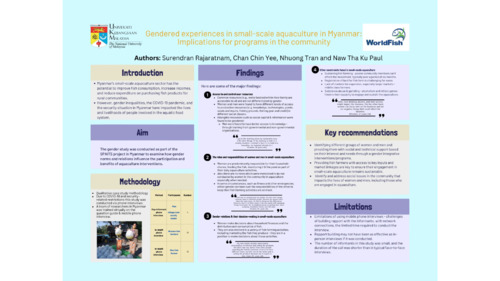Gendered experiences in small-scale aquaculture in Myanmar: Implications for programs in the community
Abstract
Myanmar is one of the world’s largest producers of fish, and its small-scale aquaculture sector has the potential to improve fish consumption, increase income, and reduce the expenses of purchasing fish products for rural people with aquatic resources. However, apart from gender inequalities, COVID-19 and the security situation in Myanmar since 2021 have impacted the lives and livelihoods of people reliant on aquaculture. We conducted a gender study and explored ways gender norms and relations influence the ability of people in the communities to engage in and benefit from aquaculture interventions by undertaking mobile phone interviews. A total of 24 women and men from two different communities in the Ayeyarwady Region were interviewed. Some of the key findings include that access to productive resources varies across households. Intangible resources, such as social networks and information, vary by gender groups, with men having better access to knowledge and people who know about fish farming than women. The roles and responsibilities within and outside of their households were not too distinct between women and men. When needed, women and men are able to take on each other’s roles. But we found women to perform productive roles more actively when their spouses are not earning an income for a variety of reasons, which include addiction to alcoholism and gambling. In order to attain the sustained changes and outcomes intended by programs, we suggest strengthening women’s collective agency and, most importantly, identifying and addressing issues within the communities that lead to addiction to alcohol and gambling, including mental health.

